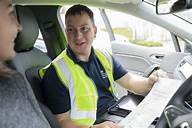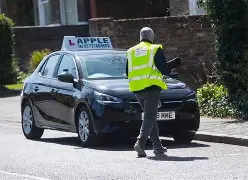
The Driver and Vehicle Standards Agency (DVSA) is rolling out significant changes to the UK car driving test in 2025. These updates aim to improve road safety, reduce test waiting times, and better prepare learners for real-world driving. Here’s a breakdown of the latest developments and what they mean for learner drivers.
Longer Notice Required for Test Changes and Cancellations
From April 8, 2025, learners must give 10 full working days’ notice to change or cancel their car driving test without losing their test fee. Previously, only 3 working days were required. This rule applies exclusively to car driving tests—other tests, such as theory or motorcycle, remain at the 3-day notice period.
The change is designed to reduce last-minute cancellations, which often result in wasted test slots that cannot be filled in time. By increasing the notice period, the DVSA hopes more learners ready to take their test can access available appointments, ultimately helping to cut down long waiting times for tests.
Trialling Real-World Driving: Updates to the Practical Test
Starting May 6, 2025, a three-month DVSA trial at 20 test centres across Great Britain is introducing several key changes to the practical driving test:
Fewer Stops:
The number of stops during the test is being reduced from four to three. This allows more time for driving on higher-speed and rural roads—areas where nearly half of young driver casualties occur, making them a critical focus for safety improvements.
Less Frequent Emergency Stops:
The emergency stop exercise, previously conducted in one in three tests, will now occur in just one in seven. This update reflects advances in vehicle safety technology, such as the widespread use of anti-lock braking systems (ABS), and frees up more time for real-world driving scenarios.
Extended Sat Nav Use:
Examiners will have the flexibility to extend the independent driving section using a sat nav from the current 20 minutes to potentially the full test duration. This change aims to better replicate modern driving conditions, where sat nav use is increasingly common.
These changes are being trialled at selected test centres, including major cities like Cardiff, Cambridge, Oxford, and Middlesbrough, and are designed to make the test more reflective of actual driving experiences without altering the content learners need to study or the overall test length.
Why Are These Changes Happening?
The DVSA’s updates are driven by two main goals:
Improving Road Safety:
Statistics show that 48% of young driver casualties happen on rural roads. By spending more test time on these high-risk roads, the DVSA aims to better prepare learners for the challenges they’ll face after passing.
Reducing Waiting Times:
By requiring more notice for cancellations and changes, the DVSA hopes to make more test slots available to those ready to take them, addressing the long-standing issue of test backlogs.
Looking Ahead
The DVSA will monitor the impact of these trial changes and may roll them out more widely if successful. Learners with tests booked at affected centres will be contacted directly to ensure they are aware of the updates and reassured that their preparation requirements remain the same.
Tougher Booking Rules to Tackle Backlogs and Touting
In response to widespread frustration over long waiting times and unfair booking practices, the DVSA introduced new terms and conditions for its online business service (OBS) in January 2025. Now, only Approved Driving Instructors (ADIs) or businesses employing them can book car driving tests for learners. Instructors are strictly prohibited from booking tests for students they are not actively teaching, and using a learner’s details to reserve a slot for someone else is banned. This crackdown aims to prevent the resale of test slots by third-party touts and ensure fairer access to appointments for genuine candidates.
Why the Focus on Rural and High-Speed Roads?
The driving test changes are a direct response to alarming road safety statistics: 48% of young driver casualties occur on rural roads, compared to 42% for other age groups. These environments—characterized by sharp bends, limited visibility, and variable surfaces—pose unique challenges for new drivers. By shifting more of the test onto high-speed and rural roads, the DVSA aims to better prepare learners for the real risks they’ll face after passing, rather than focusing predominantly on urban, low-speed driving.
Booking and Cancellation: What’s Changed?
From April 8, 2025, learners must give 10 full working days’ notice to change or cancel a car driving test without losing their fee, up from the previous 3 days. This rule does not apply to theory, motorcycle, lorry, or bus tests, which remain at 3 days’ notice. The aim is to reduce last-minute cancellations and make more slots available for those ready to take the test, helping to meet the DVLA’s ambitious target of reducing waiting times to seven weeks by December 2025.
Conclusion:
The DVSA’s 2025 driving test reforms represent a strategic response to persistent challenges in road safety and test accessibility. By extending the notice period for test cancellations and changes from 3 to 10 working days, the DVSA aims to reduce wasted test slots and make it easier for ready candidates to secure appointments, directly targeting the long-standing backlog and aiming to cut waiting times to seven weeks by the end of the year.Simultaneously, the practical test is being modernized through a three-month trial at 20 centres, with changes such as fewer stops, less frequent emergency stop exercises, and the option for extended independent driving using sat nav. These updates are designed to better reflect real-world driving conditions—especially on rural and high-speed roads, where nearly half of young driver casualties occur—without increasing the test’s difficulty or duration.
Crucially, these reforms do not alter the core content or length of the test, ensuring that learners are assessed on the same essential skills while being exposed to scenarios that more closely mirror everyday driving challenges. The changes underscore the DVSA’s commitment to both improving road safety and making the test process fairer and more efficient for all aspiring drivers.
To read more, click here
